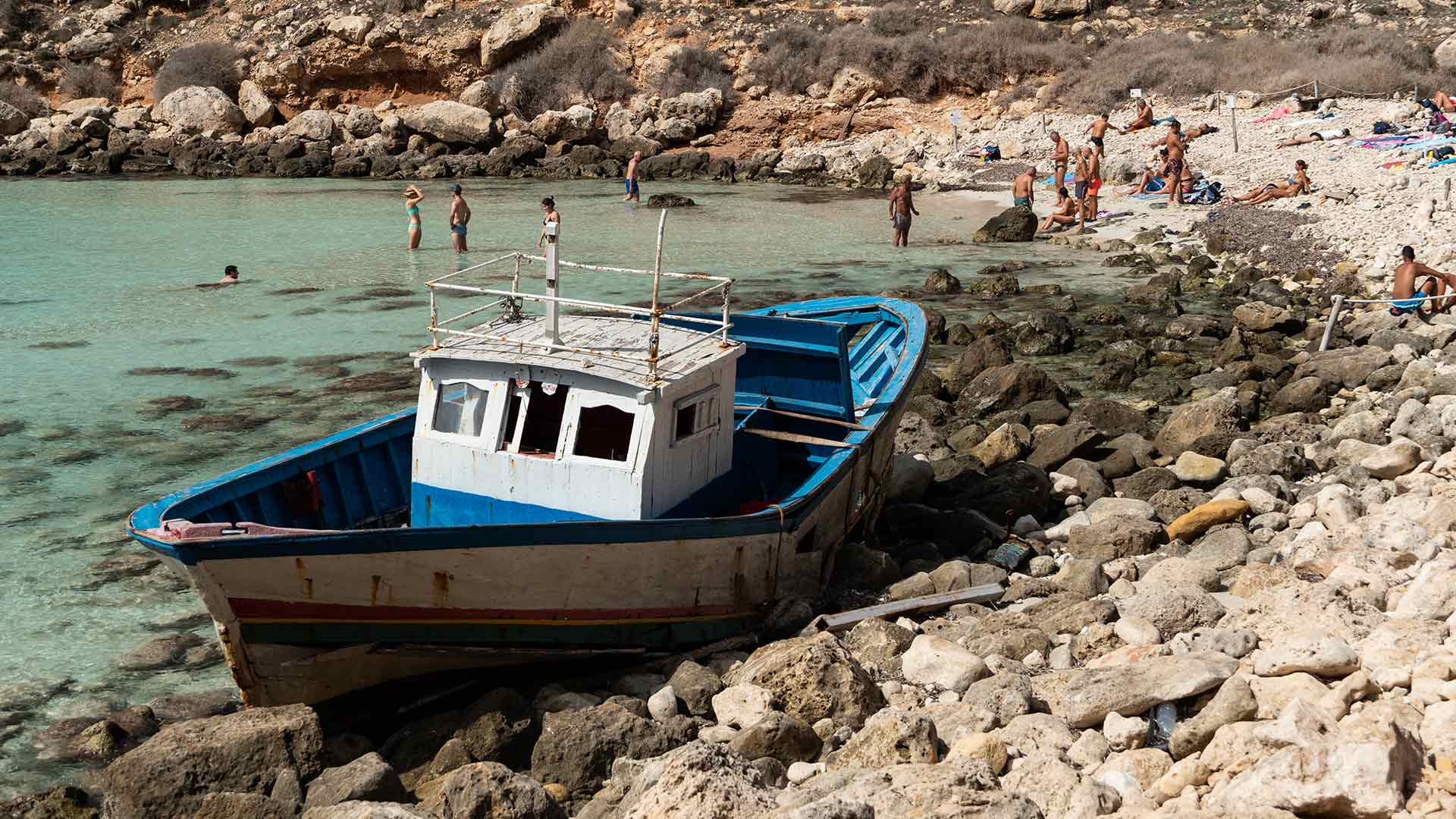Closer to Tunisia than to Sicily, the island of Lampedusa (barely 135 kilometers from the city of Mahdia) is one of the southernmost points of Europe, and where the nearly materialised dreams of Tunisian migrants frequently fail. Under a bilateral agreement between Tunisia and Italy, Rome systematically repatriates Tunisian nationals that arrive by sea. Every week, at least two charter flights take off from various Italian cities (Rome, Milan, Palermo), discreetly transporting about thirty migrants each to Enfidha-Hammamet airport.
Following the first wave of Covid-19, with the exacerbation of the social and economic crisis, Italy experienced a vast increase in arriving Tunisians. Between January and October, about 11, 212 harragas* crossed the European border with the hopes of staying there. While the Italian press reports “ a new influx" of migrants, this is virtually unnoticeable in Lampedusa. Coastguard operations carried out under supervision of UNHCR (United Nations High Commissioner for Refugees) operators, take place discreetly at the dock of the port, a restricted military zone, far from the eyes of the tourists flocking towards the city centre.
When the weather is on their side, most Tunisians don’t need to call for help, because they manage to reach the beach on their own. In the early mornings, a police van patrols this island of barely twenty square kilometers in order to catch them. Deserted between rocks, their abandoned boats are found along the southern beaches of Lampedusa, not far from the seasonal tourists, before being confiscated and stacked in a shipwreck graveyard.
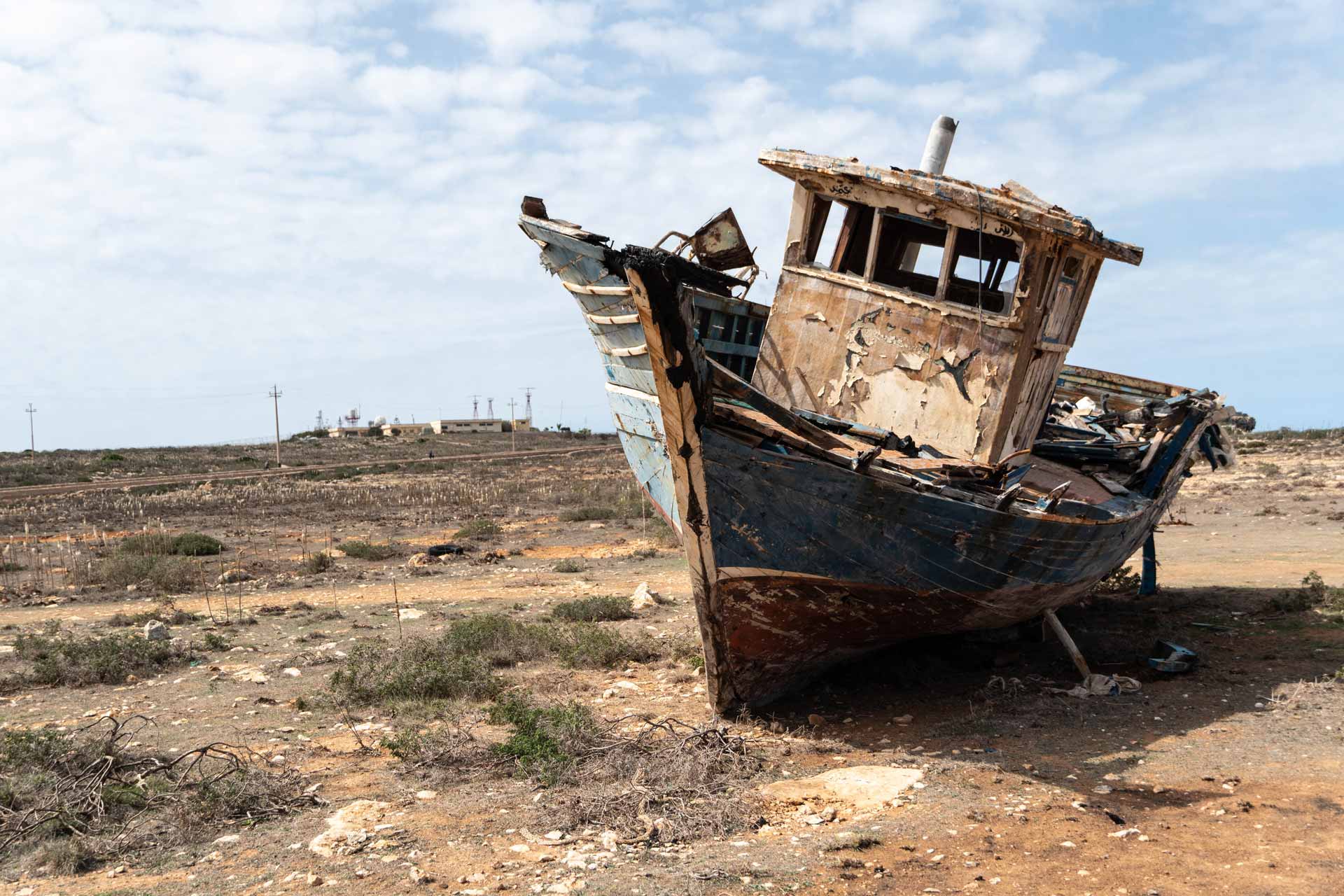
In Lampedusa, the boats abandoned by migrants are placed in shipwreck graveyards. In June 2020, a warehouse a few kilometers from the city was destroyed by arson: this boat is the only one that remains.
THE LONG WAIT AT LAMPEDUSA
"
After disembarking, the Tunisians are identified and handed a form carrying the status of a legal notice. It’s at this stage that they have the right to apply for asylum, however no one explains what this document is to them. They simply indicate where
to sign. This is how most Tunisians get registered as economic migrants without their knowledge", explains Sami Aidoudi, a legal assistant and mediator for the Association for Legal Studies on Immigration (ASGI) who has helped many newcomers.
For years, the organisation has denounced the discriminatory treatment of Tunisian migrants under the cover of a simplified, well-worn deportation procedure which lacks transparency.
The ASGI has filed several appeals with the European Court of Human Rights for violations of rights in the expulsion procedures of Tunisians.
Ayoub* is one of these cases. Originally from southern Tunisia, he arrived by sea at the end of September, and is forced to live in uncertainty, waiting around, sitting in the courtyard of the hotspot with his fellow travelers. On his Facebook profile: a picture of the Colosseum, an Italian flag, and friends congratulating each other. For this 20-year-old, this is not the first time in Italy. Deported at the beginning of the summer, he returned only a few months later. " I had no precedent, I did nothing at all. Why was I deported?” he asks. His rights or the procedures were never explained to him.
But being deported didn’t prevent him from going back. Ayoub is well aware of the living conditions in the island's hotspot: " The water and the lights are cut off. Sometimes they turn them on. We endure terrible treatment, and we don’t know what the upcoming days will have in store for us."
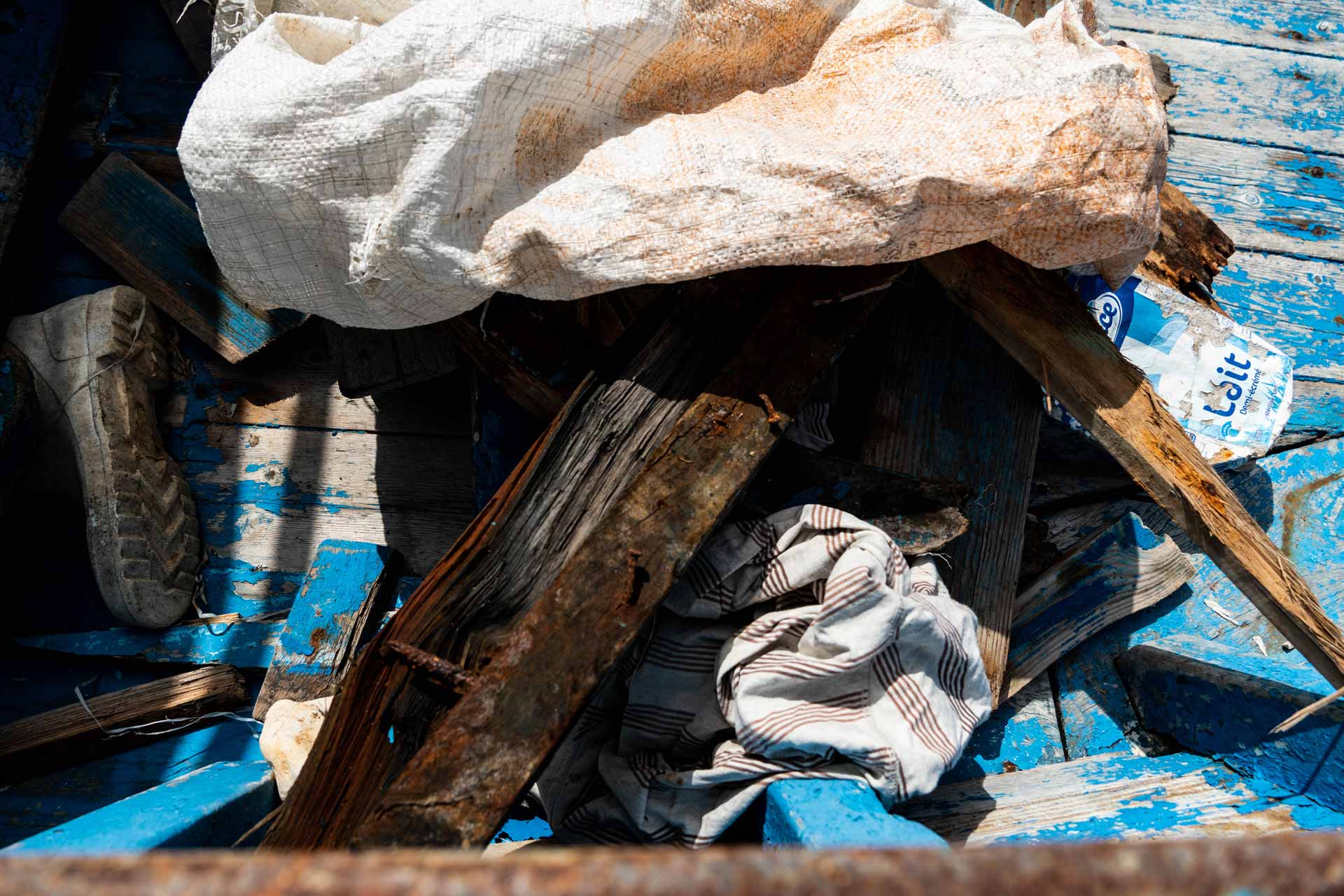
Objects abandoned after the trip: a boot, a sheet, an empty carton of milk. Upon arrival, the harragas quickly abandon their boats. A police van goes around the island to confiscate them.
" Once they are back in the hotspot, we won't see them anymore", notes Claudia Vitali, operational manager of Mediterranean Hope, the only association present during the coastguard operations. Inaccessible to humanitarians and journalists, controlled by the military, and managed by a private cooperative under the watchful eye of the Ministry of the Interior: the former barracks that were transformed into a reception centre are constantly overcrowded.
The building is hidden between two hills on the outskirts of the city, and in theory the migrants aren’t allowed to leave. "It's a way to avoid any contact between locals and migrants!", says Antonino Taranto (a resident of Lampedusa and founder of the Historical Archive of the island) who wants to support initiatives in the opposite direction. In practice, some migrants still manage to get out through the fence and walk into the city center and buy cigarettes or groceries at the supermarket - but with the Covid-19 health restrictions, controls were reinforced.
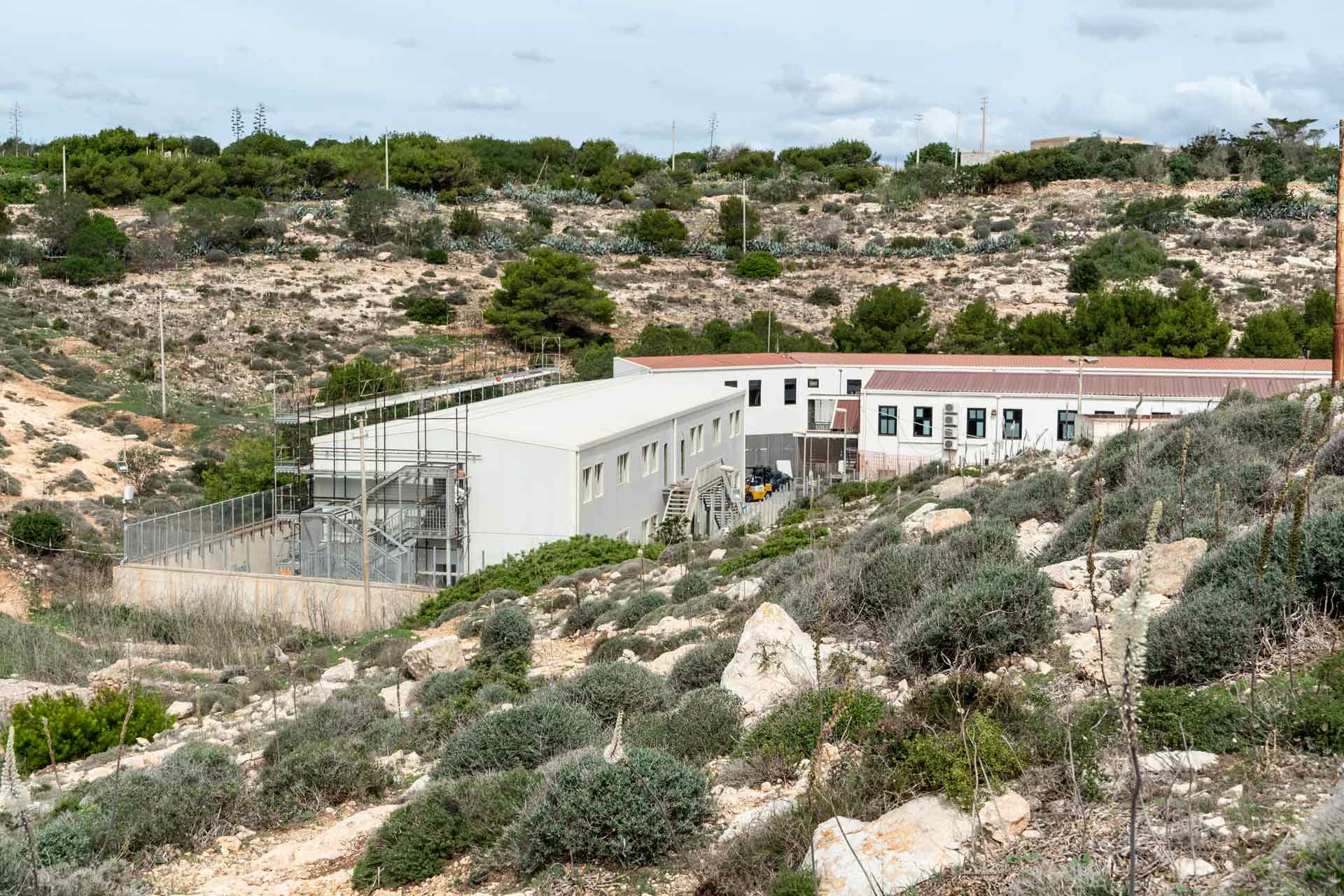
Hidden in between two hills, the old barrack of Contrada Imbriacola serves as a hotspot. Controlled by the military, the center can accommodate up to 328 people but is regularly overcrowded
QUARANTINE, A NEW OBSTACLE
Many Tunisians go to the headquarters at Mediterranean Hope to take advantage of the internet connection, or simply to talk with them. " For them, this period is very hard psychologically because they know that they will most likely be repatriated", says Claudia Vitali. The feeling of uncertainty has increased since the start of the quarantine period in April, which was supposed to only last two weeks, but has exceeded this time frame many times. At night, ferries rented out by the Italian state to private naval companies dock at Cala Pisana, just outside of Lampedusa. They don’t dock for any longer than the time it takes for the migrants to board, before setting out again to southern Italy. As reported in a statement by the Ministry of Transport, Rome spends 4,037,000 Euros on each quarantine ship.
"I always wonder about my fate, and I'm afraid that I’ll be deported again. I don't know if I will be released after quarantine. I'm psychologically exhausted, but they won't let us leave", says Ayoub, who continues his journey on a quarantine ferry from which he can see Palermo from a distance.
Ayoub's journey shows the different stages of Tunisian migrants in Italy. Departing from Gabes, Ayoub is stuck inside a hotspot in Lampedusa and placed in a quarantine ship. He is then taken to a repatriation centre before being deported to Tunisia by plane.
In May, his stay in these outposts cost Bilal Ben Messaoud his life. He was a 22-year-old Tunisian boy who jumped off of the ship Moby Zazà to try to swim to Sicily. A few months later, a 15-year-old minor from the Ivory Coast, Abou Dakite, also passed away due to not receiving the medical attention he needed in time.
Numerous videos shared by the harraga illustrate their precarious living conditions on these ships, where the evacuation of those that have tested positive for Covid-19 only happens in case of discomfort. At the beginning of October, a group of Tunisians who were detained for more than a month on the ship Augusta (despite two negative PCR tests), began a hunger strike to demand their release. Imed Soltani, president of the association La terre pour tous (Earth for All) which represents the families of those lost at sea, is collecting and sharing photos and videos of the violations against migrants. In August, the association organised a sit-in in front of the Italian Embassy in Tunis. " We simply ask to respect international laws, which don’t allow for collective deportations. The asylum requests of Tunisians must be considered", he says.
Mauro Palma, the "Italian Guarantor of Detained Persons", also pointed out this legal failure: " The people on board cannot apply for asylum, and victims of trafficking or unaccompanied minors are not protected", he denounced.
Many Tunisians find themselves in the middle of the sea once more (this time in quarantine) - but this is not the case for all of them. Deported in August, Ahmed looks back on the stages of a journey that ended up in the same hairdressing salon that he had left in search of a better job. " During quarantine, Tunisians were separated from the others. We traveled 26 hours on a bus from Sicily to northern Italy, only to be locked up in a centre near Turin", he says. To be able to know where he was, Ahmed took screenshots from Google Maps. " No one explained to us what was happening next. We signed several documents, but we were left with no choice. I didn't know what it was all about.” At the end of quarantine, Tunisians are requested to sign a deportation decision that will lead to their repatriation, confirms ASGI's legal assistant Sami Aidoudi.
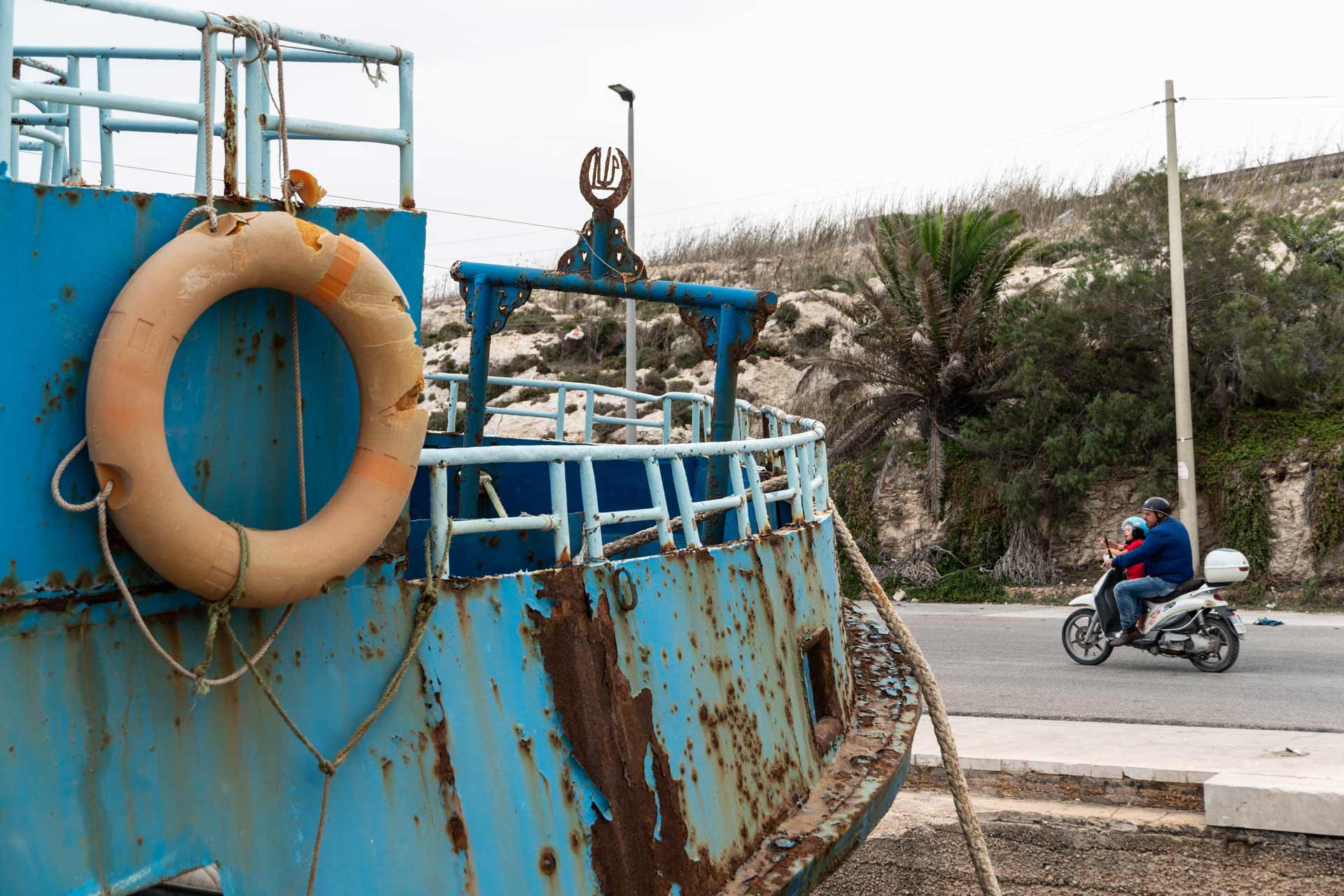
At the port of Lampedusa, the boats coming from Libya or Tunisia are confiscated by the authorities; sedentary and rusting: their stories merging with time. This boat has transported more than 300 people to the Sicilian coast.
A DEPORTATION NOTICE, THE BEST CASE SCENARIO
The final stop before deportation are the Repatriation centres (CPRs) where migrants await their impending departure. After having passed through a CPR in Turin, Ahmed describes it as “ a prison where violence is the main agenda". At the time of establishing these centres in 2017, Marco Minniti (former Minister of the Interior) had 715 spaces available, a sum which was increased to 1,085 in 2019.
Three years later, the issue of overpopulated CPRs is far from being solved. Between the overcrowdedness and bureaucratic and structural difficulties, Italy repatriates only 20% of those who have received a deportation order, according to a study conducted by Openpolis and ActionAid. For this reason, a few of these Tunisians receive a seven-day deportation notice: they are free to go, but with the requirement of leaving the country independently.
As the option of an asylum application doesn’t exist, the deportation notice is the only way of staying in Europe. This paper - " the pass" as Ahmed calls it - condemns them to a life in hiding, a position of irregularity, and in fear of being sent back to Tunisia. The possibility of this, despite only concerning a minority, nevertheless fuels the hopes of the majority. " I have friends who are in Paris, whereas I'm back here. Why? As soon as I get enough money, I'll leave", vows Ahmed. He dreams of joining his cousin in France via Lampedusa, since " the crossing is less risky", but first and foremost cheaper (about 4,000 dinars according to several testimonies). To speed up the departure process to Tunisia, " those who have previously been deported no longer even go through the CPRs, but can be directly repatriated following quarantine", confirms the legal assistant Sami Aidoudi.
According to the ASGI mediator, " from arrival to departure, Tunisian migrants are neither aware of their situation, nor their rights. Everything is done ambiguously, aiming to push them towards deportation. When migrants apply for international protection, they often don’t even receive papers proving that the application has actually been considered. He can consequently still find himself in a CPR and be deported."
In the absence of a clear and unified procedure, even associations find it difficult to follow the process from start to finish. " It is for this reason that, when brought before a ‘justice of the peace’, most of them don’t ask for political asylum or humanitarian protection", Aidoudi emphasises.
Majdi Karbai (a deputy from the democratic bloc, elected to the Tunisian Parliament in the Italian constituency) closely follows the migration file: " Recently, two minors found themselves in a repatriation centre, which is illegal. On the 20th of October, a young man was deported before the result of his PCR test. He tested positive for Covid-19", he recalls.
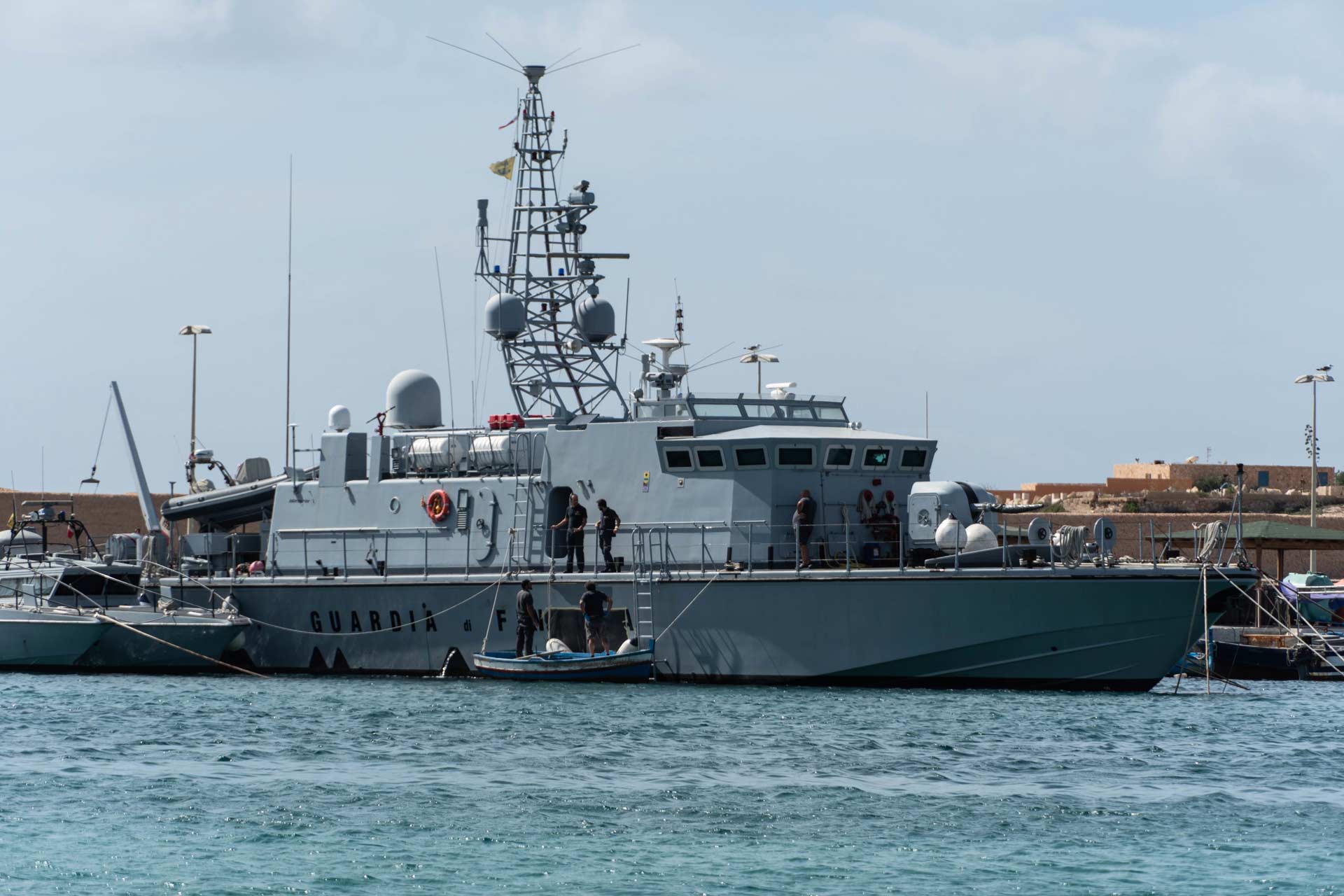
A small boat of Tunisian nationals is recovered by the Italian finance police for inspection. This island, which barely has 5,000 inhabitants, is patrolled day and night by hundreds of policemen sent to Lampedusa by the Ministry of the Interior.
RETURN, no matter the COST
Despite these difficulties, the deportation of Tunisians continues to happen relatively quickly compared to other nationalities, and the Italian Ministry of the Interior recently announced that the number of returnees has doubled. In addition to the usual Monday and Thursday flights, new ones are now being added. This decision is based on a bilateral agreement from April 2011 between the Tunisian government of Béji Caïd Essebsi and his Italian counterpart Silvio Berlusconi, signed by the Interior Ministers at the time: Habib Essid and Roberto Maroni.
Nine years ago, 55,000 Tunisians reached the Italian coast after the 2011 revolution. " At that time, while arrivals of Tunisians were increasing, migrants were not being evacuated from the island. In April, Berlusconi visited the island and presented us with a solution to Lampedusa's problems: the deportation agreement", recalls Antonino from the island's Historical Archive, where he keeps a video of that day and some photos of the hill where several migrants had set up tents.
Since then, the agreement has been constantly renewed, despite the many issues it poses from a legal standpoint, especially as it authorises collective expulsions that contradict international conventions on the refugee status.
As explained by the regional director of Lawyers Without Borders, Antonio Manganella, " this agreement represents an anomaly. Several bilateral agreements of this kind have been signed, but they first passed through the Parliament". This was not the case for this agreement, neither in Tunisia, nor in Italy. " In the absence of an announcement in the Official Journal of the Republic of Tunisia, the content of such an agreement remains very vague. It’s therefore difficult to identify the appropriate ratification path that it should have followed. Nevertheless, since this is an agreement that can impact the respect of Tunisian rights, it should have been the subject of a parliamentary debate" he continues.
Following a visit from the Italian government to Tunisia, and their decision to increase the number of deportees, the associations Lawyers Without Borders, ASGI, and the Tunisian Forum for Economic and Social Rights (FTDES) made requests to the Italian and Tunisian governments for gain access to the files. Their objective, as clarified in a joint statement, was to publish the contents of the agreement concluded on August 17, 2020.
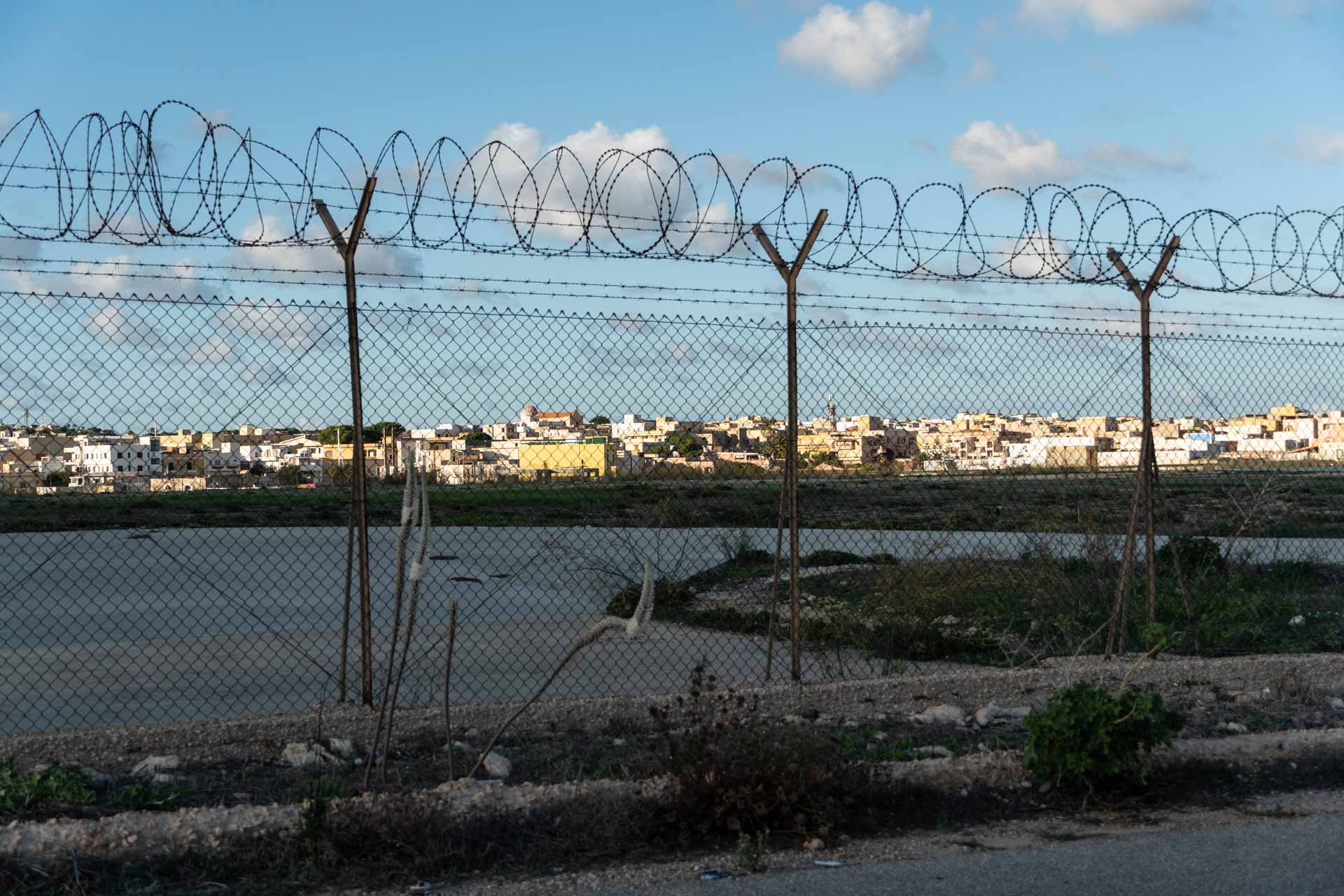
The city of Lampedusa, from behind the barbed wire surrounding the airport.
The agreement provides economic support to the sum of 11 million euros for strengthening border control. "Once again, this money will not contribute to the development of projects that are useful to the community, nor the creation of jobs in marginalized regions", commented MP Majdi Karbai.
Ahmed is aware of this. Right back where he started, in his parents' home, he works during the days. The rest of the time he just waits. All he has left from his trip to Europe is a pile of crumpled papers. On the day of his deportation, escorted by two police officers and handcuffed like his fellow travelers, he went down the peninsula in the opposite direction: from Turin to Palermo. In Sicily, he met officials from the Tunisian consulate for a quick identification before taking off. " They asked me if I was Tunisian, I said yes."
Two hours later, he left Enfidha-Hammamet airport. " I signed a document that would ban me from crossing the borders of the European Union for five years. But I will leave as soon as possible", he said. For him, this deportation was just one step in a journey that will repeat two, three, or four times: until he can stay in Europe. No matter the cost.
